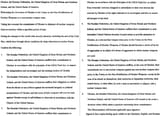The Budapest Memorandum on Security Assurances is a diplomatic agreement signed in December 1994, which provided security assurances to Ukraine in exchange for its commitment to give up its nuclear arsenal. The memorandum was signed by three nuclear powers: the United States, the United Kingdom, and Russia, along with Ukraine.
Key points of the Budapest Memorandum include:
1. **Security Assurances**: The signatory states committed to respect Ukraine's independence and sovereignty, and to refrain from using force or threatening to use force against Ukraine's territorial integrity.
2. **Nuclear Disarmament**: In return for these assurances, Ukraine agreed to eliminate its nuclear weapons, which it inherited after the dissolution of the Soviet Union. By 1996, Ukraine had transferred all of its nuclear warheads to Russia for dismantling.
3. **International Cooperation**: The memorandum also encouraged cooperation among the signatories in the event of a threat to Ukraine's security.
The Budapest Memorandum has been a subject of significant discussion, especially in light of Russia's annexation of Crimea in 2014 and its involvement in the conflict in Eastern Ukraine. Many have argued that the assurances provided in the memorandum were not upheld, leading to debates about the effectiveness of such agreements in ensuring security and stability.
